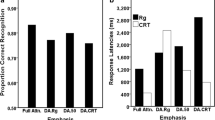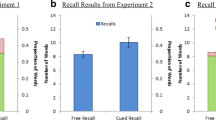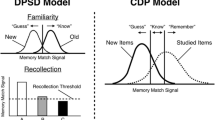Summary
In an experiment with young and elderly adults, memory of unfamiliar actions performed by the subjects was compared with memory of actions low and high in familiarity, in order further to assess the role of a knowledge base as regards memory material encoded by enacting. Memory of similar actions encoded verbally was also assessed. The findings showed that the type of encoding, as well as familiarity, determined free-recall memory performance. The highest free-recall scores were found for familiar actions encoded by performance, in both an immediate and a delayed free-recall test. Recognition memory was also enhanced by enacting, whereas the influence of familiarity with an item upon recognition performance was limited to actions encoded verbally. The role of familiarity in recognition performance of actions encoded verbally was reversed compared with that in free recall, in that recognition of unfamiliar actions was most effective. Moreover, age-related memory deficits were found in this study. Elderly adults showed a consistently lower level of performance than younger subjects in both types of free-recall test and in the recognition test. This effect of age was found regardless of the type of encoding, demonstrating that age-related memory differences are not compensated by motor encoding. The age effect was also found regardless of familiarity with the items, and was most significant for unfamiliar actions. This demonstrates that elderly adults have particular difficulty in processing unfamiliar memory material.
Similar content being viewed by others
References
Bäckman, L. (1984). Age difference in memory performance: Rules and exceptions. Doctoral Dissertation, Department of Psychology, University of Umea, Sweden.
Bäckman, L., & Nilsson, L. G. (1985). Pre-requisites for the lack of age differences in memory performance.Experimental Aging Research, 11, 67–73.
Bäckman, L., & Nilsson, L. G. (1991). Effects of divided attention on free and cued recall of verbal events and action events.Bulletin of the Psychonomic Society (in press).
Cohen, R. L. (1981). On the generality of some memory laws.Scandinavian Journal of Psychology, 22, 267–281.
Cohen, R. L., Peterson, M., & Mantini-Atkinson, T. (1987 a). Interevent differences in event memory: Why are some events more recallable than others?Memory & Cognition, 15, 109–118.
Cohen, R. L., Sandler, S. P., & Schroeder, K. (1987 b). Aging and memory for words and action events: Effects of item repetition and list length.Psychology and Aging, 2, 280–285.
Einstein, G. O., & Hunt, R. R. (1980). Levels of processing and organization: Additive effect of individual item and relational processing.Journal of Experimental Psychology: Harman Learning and Memory, 6, 588–598.
Einstein, G. O., & McDaniel, M. A. (1987). Distinctiveness and the mnemonic benefits of bizarre imagery. In M. A. McDaniel & M. Pressley (Eds.),Imagery and related mnemonic processes (pp. 78–102). New York: Springer.
Engelkamp, J. (1990).Das menschliche Gedächtnis. Göttingen: Hogrefe.
Engelkamp, J., & Krumnacker, H. (1980). Imaginale und motorische Prozesse beim Behalten verbalen Materials.Zeitschrift für experimentelle und angewandte Psychologie, 12, 511–533.
Engelkamp, J., & Zimmer, H. D. (1983). Der Einfluβ von Wahrnehmen und Tun auf das Behalten von Verb-Objekt-Phrasen.Sprache & Kognition, 2, 117–127.
Engelkamp, J., & Zimmer, H. D. (1985). Motor programs and their relation to semantic memory.German Journal of Psychology, 9, 239–254.
Graesser, A. C., Woll, S. B., Kowalski, D. J., & Smith, D. A. (1980). Memory for typical and atypical actions in scripted activities.Journal of Experimental Psychology: Human Learning and Memory, 6, 503–513.
Hunt, R. R., & Marschark, M. (1987). Yet another picture of imagery: The roles of shared and distinctive information in memory. In M. A. McDaniel & M. Pressley (Eds.),Imagery and related mnemonic processes (pp. 129–150). New York: Springer.
Kausler, D. H., & Lichty, W. (1988). Memory for activities: Rehearsalindependence and aging. In M. L. Howe & C. J. Brainerd (Eds.),Cognitive development in adulthood (pp. 93–131). New York: Springer.
Kausler, D. H., Lichty, W., Hakami, M. K., & Freund, S. J. (1986). Activity duration and adult age differences for activity performance.Psychology and Aging, 1, 80–81.
Klix, F. (1988). Gedächtnis und Wissen. In H. Mandl & H. Spada (Eds.),Wissenspsychologie (pp. 19–54). Munich: Psychologie Verlags Union.
Knopf, M. (1987).Gedächtnis im Alter — Empirische Studien zur Entwicklung des verbalen Gedächtnisses bei älteren Menschen. Berlin, Heidelberg, New York: Springer.
Knopf, M. (1988). Die Rolle des Wissens für das Gedächtnis älterer Menschen.Zeitschrift für Gerontologie und -psychiatrie, 1, 117–126.
Knopf, M. (1990). deVertraut, unvertraut, neuartig, kurz, lang? Determinanten des Gedächtnisses für Handlungen bei jüngeren und älteren Menschen. In M. Knopf & W. Schneider (Eds.),Entwicklung — Festschrift zum 60. Geburtstag von Franz Emanuel Weinert (pp. 100–116). Göttingen: Hogrefe.
Knopf, M., & Neidhardt, E. (1989 a). Aging and memory for action events: The role of familiarity.Developmental Psychology, 25, 780–786.
Knopf, M., & Neidhardt, E. (1989 b). Gedächtnis für Handlungen unterschiedlicher Vertrautheit — Hinweise aus entwicklungspsychologischen Studien.Sprache & Kognition, 8, 203–215.
Lehrl, S. (1977).Mehrfach-Wortschatz-Intelligenztest, MWT-B. Erlangen: Straube Verlag.
Mandler, G., Goodmann, O., & Wilkes-Gibbs, D. L. (1982). The wordfrequency paradox in recognition.Memory & Cognition, 10, 33–42.
Mohr, G., Engelkamp, J., & Zimmer, H. D. (1989). Recall and recognition of self-performed acts.Psychological Research, 51, 181–187.
Nilsson, L.-G., Cohen, R. L., & Nyberg, L. (1989). Recall of enacted and nonenacted instructions compared: Forgetting functions.Psychological Research, 51, 188–193.
Schneider, W., & Pressley, M. (1989).Memory development between 2 and 20. Berlin, Heidelberg, New York: Springer.
Snodgrass, J. G., & Corwin, J. (1988). Pragmatics of measuring recognition memory: Applications to dementia and amnesia.Journal of Experimental Psychology: General, 117, 34–50.
Waldmann, M. R. (1990).Schema und Gedächtnis. Heidelberg: Asanger.
Author information
Authors and Affiliations
Additional information
The experiment was conducted as part of the fulfillment of the requirements for obtaining the diploma degree of Maria Schumacher. Portions of this paper were presented at the 32nd Tagung experimentell arbeitender Psychologen, Regensburg, April 1990.
Rights and permissions
About this article
Cite this article
Knopf, M. Having shaved a kiwi fruit: Memory of unfamiliar subject-performed actions. Psychol. Res 53, 203–211 (1991). https://doi.org/10.1007/BF00941388
Issue Date:
DOI: https://doi.org/10.1007/BF00941388




